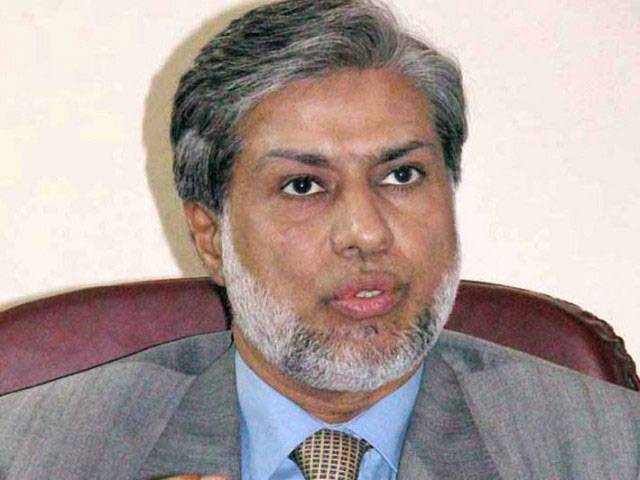ISLAMABAD - The Economic Advisory Council (EAC) has proposed to expedite the process of bringing wealthy non-taxpayers into tax net to broaden the extremely low tax base of the country.
The Economic Advisory Council, which met under the chairmanship of Finance Minister Senator Ishaq Dar, reviewed the economic situation of the country. Sources informed that EAC members were of the view that government should keep eye on the non-taxpayers of the posh areas of the different cities. Similarly, the government should examine the details of utility bill and foreign trips of those living in posh areas but not paying their due taxes.
Sources informed that EAC members also showed concerns over the violation of the Fiscal Responsibility and Debt Limitation Act (FRDLA) 2005, as public debt exceeded the limit of 60 per cent of GDP on June 30, 2013 and touched the level of 62.7 per cent of GDP. Therefore, the EAC stressed that Debt Limitation Act 2005 should be implemented to streamline all debt related financial instruments and also to streamline the national debt-related issues through an exhaustive consolidation of financial figures/tabulation.
Meanwhile, according to press statement issued here, finance minister welcomed the members of the Economic Advisory Council and expressed the hope that the second meeting shall mark re-activation of EAC, enabling the forum to provide an opportunity to interact and exchange ideas with prominent professionals associated with the economic development issues of Pakistan. Ministry of Finance wanted to benefit from their collective wisdom and was open to any suggestion, which could add value. If we all put our heads together we can turn around Pakistan’s economy, he added. Ministry of Finance was ready to provide EAC members access and arrange meetings so that the latter can play a productive role in reshaping Pakistan’s economy.
Finance minister briefed the members of EAC regarding Pakistan’s economic indicators, which have been positively registered by IMF in terms of upward surge in development sectors. GDP now is going up and inflation is declining because of proactive measures undertaken by the present government. Stability in the forex market is another factor. Besides POL prices in international market are getting favourably settled. The minister added that overall financial forecast/projection speaks of food and POL prices registering stability to the benefit of country’s economy.
The minister informed the meeting participants that 10% increase in overseas remittances has been registered up to the current month and revenue collection targets have registered 17.5% growth in 7 months and 21% in January 2014 as compared to same period last year. The government intends to positively enhance the reserves up to 16 billion dollars by end of December 2014. The meeting participants were further briefed that multilateral donors visiting Pakistan are keen to invest and contribute to strengthening of Pakistan’s economy through various negotiated financial instruments. By end of March 2014 a sizeable increase in forex reserves is anticipated with a projected figure more than 10 billion dollars since forex inflows are adding up steadily.
The FBR management informed the EAC participants regarding rationalization of its taxation-based concessionary regime, with a projected revenue collection target during 2013-14 touching Rs.2471 billion as against the previous year’s (2012-13) revenue collection of Rs.1946 billion.
Presentation on oil and gas reserves in Pakistan was given to the participants, which evoked stimulating discussion and way forward. EAC participants expressed their satisfaction over the policy statement of the finance minister. The 30% austerity measures adopted by the present democratic government are likely to generate enough financial cushion to meet its fiscal deficit target.
Thursday, November 21, 2024
Bring wealthy non-taxpayers into net: EAC
Govt should examine details of utility bills and foreign trips of those living in posh areas but not paying their due taxes

Caption: Bring wealthy non-taxpayers into net: EAC
Ishaq Dar chairs meeting on solarization of agricultural tube wells
12:51 PM | November 21, 2024
Bilawal Bhutto urges federal government to reconsider Indus canal projects
12:27 PM | November 21, 2024
Petition filed in LHC against Bilawal Bhutto and Ayaz Sadiq for election act violation
12:06 PM | November 21, 2024
Pakistan to convert 30% of vehicles to electric by 2030: Aleem Khan
November 21, 2024
Iqbal’s philosophy source of inspiration for humanity, says Saif
November 21, 2024
-
Hunger crisis to increase in South Sudan, warns UN
-
Hunger crisis to increase in South Sudan, warns UN
-
Pakistan’s judiciary champions climate justice at COP29 in Baku
-
Punjab struggles with persistent smog as Met Office forecast rainfall
-
Punjab residents face escalating smog crisis as pollution levels soar across country
-
Qatar says Hamas 'no longer welcome' in Gulf state
Land of Vigilantes
November 21, 2024
United in Genocide
November 21, 2024
Finally Fighting Back
November 21, 2024
Digital Stagnation
November 20, 2024
Xi’s Red Lines
November 20, 2024
Independent Supreme Court
November 21, 2024
Fat Loss Fantasy
November 21, 2024
Tackle Corruption Within School Boards
November 20, 2024
To Be Opportunistic
November 20, 2024
Democratic Backsliding
November 20, 2024
ePaper - Nawaiwaqt
Nawaiwaqt Group | Copyright © 2024





